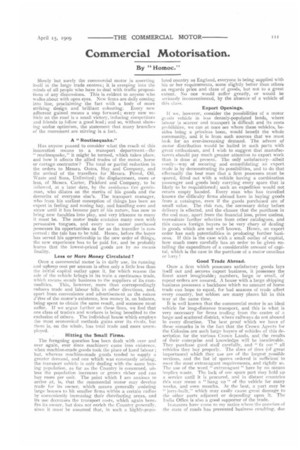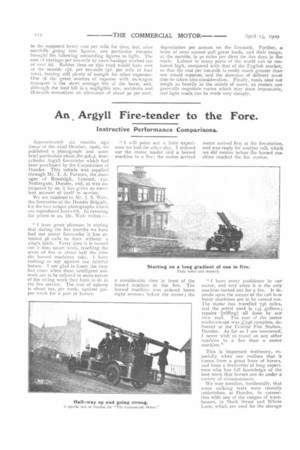Commercial Motorisation.
Page 3

Page 4

If you've noticed an error in this article please click here to report it so we can fix it.
By " HOITIOC."
Slowly but surely the commercial motor is asserting itself in the large trade centres; it is creeping into the niinds of all people who have to deal with traffic propositions of any dimensions. This is evident to anyone who walks about with open eyes. New firms are daily coming into line, proclaiming the fact with a body of more striking design and brilliant colouring. Every new adherent gained means a step forward; every new vehicle on the road is a small victory, inducing competitors and friends to follow a good lead; and so, without showing undue optimism, the statement that many branches of the movement are stirring is a fact.
A "Routinequake."
Has anyone paused to consider what the result of this innovation means to a transport department—the " routinequake," it might be termed, which takes place, and how it affects the allied trades of the motor, horse or cartage contractor? The total or partial reduction in the orders to Messrs, Oates, Hay and Company, and the arrival of the travellers for Messrs. Petrol, Oil, Waste and Sons, Unlimited; the displacement, more or less, of Messrs. Carter, Pickford and Company, to be followed, at a later date, by the assiduous tire gentleman, who dilates on the merits of his goods and the demerits of everyone else's. The transport manager, who from his earliest conception of things has been an expert in feeling and nosing hay, and handling earn and straw until it has become part of his nature, has now to bring new faculties into play, and very irksome to many it must be. The motor trade contains many rnen with persuasive tongues, and every new motor purchased possesses its opportunities as far as the traveller is concerned: the tale has to be told. Hence, before the buyer has served his apprenticeship to the new order of things, the new experience has to be paid for, and he probably learns that the lowest-priced goods are by no means finality.
Less or More Money Circulated?
Once a commercial motor is in daily use, its running and upkeep cost per annum is often only a little less than the initial capital outlay upon it, for which reason the sale of the vehicle brings in its train a continuous trade, which means steady business to the suppliers of its commodities. This, however, more than correspondingly reduces trade and labour bills in other directions, and, apart from convenience and advertisement as the raison (.1'4tre of the motor's existence, less money is, on balance, being spent to obtain the same result, and someone must suffer. If we argue further on these lines, we find that one class of traders and workers is being benefited to the exclusion of others. The individual house which employs the most economical methods gains over its rivals, but there is, on the whole, less total trade and more unemployed.
Hitting the Small Firms.
The foregoing question has been dealt with over and over again, ever since machinery came into existence, when machine-made gosxls took the place of hand labour ; but, whereas machine-made goods tended to supply a greater demand, and one which was constantly arising, the transport vehicle is only dealing with the same buying population, as far as the Country is concerned, unless the population increases or grows richer and can buy more per unit. The point which I am anxious to arrive at, is, that the commercial motor may develop trade for its owner, which means generally assisting large houses to hit smaller firms within a certain radius by conveniently increasing their distributing areas, and its use decreases the transport costs, which again benefits its owner, but does not enrich the Country generally, since it must be assumed that, in such a highly-popu
lated country as England, everyone is being supplied with his or her requirements, some slightly better than others as regards price and class of goods, but not to a great extent. No one would suffer greatly, or would be sceiously inconvenienced, by the absence of a vehicle of th;s class.
Export Openings.
If we, however, consider the possibilities of a motor goods vehicle in less densely-populated lands, where labour is scarcer and transport is difficult and its costs prohibitive, we can at once see where these vehicles, besides being a priceless boon, would benefit the whole community, and it is from such sources that we must look for an ever-increasing demand. The advent of motor distribution would be hailed in such parts with great enthusiasm, and I wish to suggest that manufacturers should pay much greater attention to export work than is done at present. The only satisfactory--albeit costly—way of securing and consolidating an export trade is by demonstrating its possibilities, and to do that effectually the best man that a firm possesses must be spared, fitted leut with a vehicle having a combination passenger and goods body carrying every spare that is likely to be requisitioned; such an expedition would not return empty handed. Every man who has travelled knows the difficulty firms abroad have in buying goods from a catalogue, even if the goods purchased are of small value. The risk run, the necessary delay before delivery is effected, and the chance that the purchase in the end may, apart from the financial loss, prove useless, necessitate further selection from other catalogues, and this causes foreign buyers to be very chary of dealing in goods which are not well known. Hence, an export order has such potentialities in producing further business. If this is the case with a small outlay of capital, how much more carefully has an order to be given entailing the expenditure of a considerable amount of capital, which is the case in the purchase of a motor omnibus or lorry !
Good Trade Abroad.
Once a firm which possesses satisfactory goods lays itself out and secures export business, it possesses the finest asset imaginable; numbers, large or small, of repeat orders are assured. A house with a large shipping business possesses a backbone which no amount of home trade can hope to equal, for bad seasons of trade affect every country, but seldom are many places hit in this way at the same time.
It is well known that the commercial motor is an ideal vehicle for long-distance transport, and this is what is very necessary for firms trading from the centre of a large and scattered district, where railways do not abound in every direction. The best proof which we have of these remarks is in the fact that the Crown Agents for the Colonies are such large buyers of vehicles of this description for the various Crown Lands, and the results of their enterprise and knowledge will be inestimable. They purchase good stuff carefully, and " fit out " all vehicles they buy properly. The sizes of tires (of great importance) which they use are of the largest possible sections, and the list of spares ordered is sufficient to meet the most extravagant requirements, and rightly so. The use of the word " extravagant " here by no means implies waste. The lack of one spare part may hold up a service until it is procured, and in distant countries this may mean a " hang up" of the vehicle for many weeks, and even months. At the best, a :part may be "jerry-built," which may easily cause great damage to the other parts adjacent or depending upon it. The
India Office is also a good supporter of the trade. Instances have come to my notice where the ouestion of the state of roads has prevented business resulting, due to the supposed heavy cost per mile for tires, but, after carefully going into figures, one particular instance brought the following astounding figures to light. The cost of carriage per ton-mile hr oxen haulage worked out at over 6d. Rubber tires on this road would have cost at the outside lid. per ton-mile (5d. per mile of four tons), leaving still plenty of margin for other expenses. One of the great sources of expense with ox-wagon transport is the short average life of the beast, and, although the food bill is a negligible one, accidents and ill-health necessitate an allowance of about 5o per cent. depreciation per annum on the livestock.. Further, a team of oxen cannot pull great loads, and their range, at the outside, is 30 miles per diem for five days in the week. Labour in many parts of the world can be reckoned high, compared with that of the English market, so that the cost per ton-mile is really much greater than one would suppose, and the slowness of delivery must also be taken into consideration. Finally, roads need not weigh so heavily in the minds of users, as motors can generally negotiate routes which may seem impassable, and light roads can be made very cheaply.


















